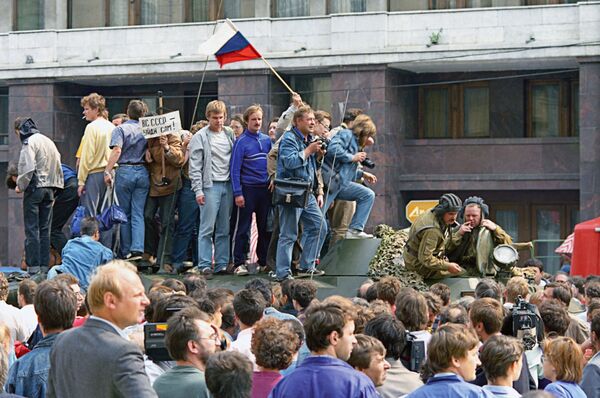There were three main stages, in my view, in the process that resulted in the end of the communist Soviet Union in ‘91. The first one was the non-signing of the treaty to create a new confederation in June 1991 – the Novo-Ogaryovo process. This practically represented the end of the Soviet Union, because afterwards, the individual republics did not even want to loosely maintain any kind of common structure with Moscow. Then came the Putsch in August, which was the last attempt on the part of the hard-liners. And then there was December 1991 when the leaders of the three Slavic states met in Belarus – the most important republics in the Soviet Union, the core of the Russian empire – and decided that they didn’t want to preserve the common state. From my point of view, the August Putsch was only a part of dramatic developments which started in the ‘80s.
The popular resistance to the Putsch played a huge role in the unfolding of events. There are two different stories of the Putsch that are told. One story is through the understanding of contemporary Russians. The other is that of direct observers and witnesses who were around in those days and remember. In my view, the August Putsch was like a real revolution in Russia, but the goal to maintain communism was lost.
Economically, the Soviet Union was a disaster. The majority of Russian people, and also people from elsewhere in the Soviet Union, felt the need for change, and so they were very much disillusioned and frustrated with the putschists. The hardliners wanted to turn everything back to some kind of old rule. There was no chance for them. They lost all kinds of support from within society, and this broke their backbone. In my view, this was their first mistake: they misjudged the mood of society, which emerged after years of Perestroika as self-assured people who were not afraid to say what they saw. Journalists played a very important role, an honest and courageous one.
This was a huge revolution in Russia. Russia freed itself from communism, like other nations in Eastern Europe also did at the time in many ways. But of course, the historical fact that Russia freed itself from communism is not present in today’s historical discourse in Russia, or in the mindset of the Russian elite. This was something historical, it was a great achievement, something that was deeply important for the future development of Russia.
This, to me, is quite shocking. Russia had a lot of achievements in the 20th century. One was, of course, the victory over Nazi Germany in ‘45, the victory and the defeat of the totalitarian ideology. The defeat of this hostile ideology was a huge achievement, and is seen today by Russian people as such. But the ‘90s showed that the reforms were being done wrong, and Russia did not have any serious or sincere help from the West with these reforms. There were just too many problems. And because the reforms in the ‘90s went wrong in so many ways, Russians have very negative feelings towards the August Putsch and the year ‘91, which they see not as the day when they were freed from communism, but on the contrary, the time when they began 10 years of nightmare and economic catastrophes. This is very sad, because it ignores the fact that Russia achieved something wonderful by gaining freedom by itself, without the help of anyone else. I think that Russia today does not identify with the ideals of Perestroika and the struggle to get rid of communism in ‘91.
The lessons of the August Putsch of ‘91 and the events surrounding it are something that we see today in many other countries. We see them today in Syria, we see developments in Tunisia, we have seen them in Ukraine, we have seen protests and demonstrations against the government and against the current order in several other countries. Those who are in power must understand that in the 21st century things are completely different. People everywhere in the world will strive for change and for their own rights and for a better economic living.
The governments of Europe, in many parts of Asia, of course in America, and in Latin America, have to understand in the future that if their people are not happy, if there is economic hardship, social hardship, then people will take to the streets and organize these movements. The Internet has opened communication, allowing people to organize themselves very quickly, to provide global information about what is happening in a demonstration or protest movement. Through new communication networks, small demonstrations can receive immediate support and solidarity from other groups, from other circles and from other important organizations. The best lesson that Russian leaders today must understand is this. They must have a grasp on the situation and an understanding of what the people want, their fears, their will and so on.
* Alexander Rahr is Director, Berthold-Beitz-Zentrum, German Council on Foreign Relations (DGAP).
This story was first published at Valdai.com
The views expressed in this column are the author’s and may not necessarily represent those of RIA Novosti.



